
20 Remarkable Vegetarian Statistics for 2024
Posted on |
Vegetarian statistics show that more and more people are shifting to this diet for ethical and health reasons. However, vegetarianism is more than the latest fashion tendency—societies have practiced it throughout history, hoping to achieve longevity or for religious and moral reasons.
Today, it’s a personal choice driven by a rising awareness of environmental issues and the importance of adopting a healthy lifestyle.
Here are some of the latest and most essential statistics on vegetarianism to help you get the facts right and make wiser choices.
Key Vegetarian Stats and Facts for 2024 (Editor’s Choice)
- 22% of the global population is vegetarian
- Vegetarians have up to 12% lower cancer rate incidence
- 5% of US consumers are vegetarian
- Nearly 40% of the Indian population follows a vegetarian diet
- A global shift to a vegetarian diet could save $1 trillion annually
- A plant-based diet reduces the risk of heart disease by 40%
- Vegetarians are 50% less likely to have diabetes type 2 than meat-eaters
- The plant-based meat substitute market is worth $1.4 billion
Global Vegetarian Statistics

1. 39.5% of the total population in India is vegetarian.
(Pew Research, The Indian Blog)
India is the country with the highest number of vegetarians. Additionally, 81% restrict meat in their diet in some form. For example, they restrain from eating certain meat or avoid eating meat on certain days. With 74.90%, Rajasthan has the highest vegetarian percentage by state, followed by Haryana (70%) and Punjab (66.75%).
2. In a year, the vegetarian population in Nigeria grew to 1.4 million people.
(Statista)
The most recent data shows that vegetarianism is becoming popular in many developing regions, especially among the young, middle- and high-income population. In fact, Nigeria is the leading country in increasing the vegetarian population.
Furthermore, stats on vegetarianism suggest that Pakistan and Indonesia saw a significant increase and now have 1.19 million and 270,600 vegetarians, respectively. Germany, Brazil, and Italy are also on the list of countries with the most significant growth of vegetarian population in one year.
3. There are an estimated 1.5 billion vegetarians globally.
(ResearchGate)
According to the latest survey available, the percentage of vegetarians in the world is estimated at 22%. Additionally, findings indicate that most of these people are vegetarians out of necessity, which means they either don’t have access to meat or have health-related reasons to go vegetarian.
In contrast, the vegetarians who opt to follow a vegetarian diet by choice amount to 75 million or approximately 1% of the global population.
4. 6% of the UK population is vegetarian.
(Finder)
In the UK, the vegetarian diet is the most common among the non-meat diets. According to the latest statistics on vegetarians, 3.1 million people follow a vegetarian diet. Furthermore, the survey conducted by Finder revealed that about 12% or 6.5 million Britons plan to become vegetarians in the future.
5. 7.5 million people in Germany declare themselves as vegetarians.
(Statista, The Guardian)
According to the latest vegetarian stats, this number has grown by 1.19 million people since 2014. Additionally, a recent survey showed that 42% of participants have deliberately reduced their meat consumption by following a plant-centered diet.
6. 5% of the US population follows a vegetarian diet.
(Gallup, Vegan News)
With this, the number of US consumers following a plant-based diet amounts to 9.7 million, increasing from just 290,000 15 years ago. Additionally, with 9%, non-white Americans are three times more likely to describe themselves as vegetarians than white Americans (3%).
7. Women account for 6% of the US vegetarian demographics.
(Gallup)
The Gallup survey indicates that women are more likely to identify as vegetarians than men (4%). Additionally, vegetarianism is more prevalent among younger Americans; 8% of the 18- to 34-year-olds follow a vegetarian diet compared to 7% of 35- to 54-year-olds and 2% of adults aged 55 and older.
8. 32% of people identify themselves as “mostly vegetarian.”
(Plant Based News)
The percentage of vegetarians in the US in 2022 is estimated to grow, considering that more and more people have been reducing their animal products consumption.
More than a third of participants in the State of the Industry Report: Plant-Based Meat, Eggs, and Dairy said they were mostly vegetarian or were actively reducing their meat consumption. What’s more, 80% believe the shift toward plant-based diets is a long-term change.
9. According to vegetarian facts and statistics, 22% of millennials have tried a vegetarian diet at some point.
(YouGov, Mintel)
For comparison, only 13% of Gen Xers and 11% of baby boomers have done the same. Additionally, 8 in 10 millennials eat meat alternatives, and nearly a third of them are trying to lean towards a more plant-based diet.
Vegetarianism Health Statistics

10. A vegetarian diet could save 7.3 million lives.
(Time)
Researchers created four scenarios to assess the health and effects of the vegetarian diet. One scenario is based on the current consumption trends.
Another includes following a diet based on the global dietary guidelines. The last two are vegan and vegetarian scenarios. They found that the greatest benefits could come from a vegetarian or vegan diet (avoiding 7.3 million and 8.1 million deaths, respectively).
Save money on healthy food using Freshly promo codes!
11. A plant-based diet reduces the risk of heart disease death by 40%.
(Medical News Today, EurekAlert)
Vegetarian vs. meat eater statistics reveal that almost 60% of people consuming plant-based proteins have healthier heart arteries than those consuming meat-based proteins. Additionally, people who are vegan, vegetarian, or follow another plant-based diet have a 40% lower risk of coronary heart disease.
12. Vegetarians show a 10–12% lower incidence rate for all cancers.
(NCBI)
The vegetarian cancer rate is significantly lower compared to the non-vegetarian cancer rate. Results for specific cancers are less clear, and there’s still a need for more detailed research.
However, direct and indirect evidence links plant foods and plant constituents to maintaining a healthy weight and reducing cancer risk. At the same time, research has linked the consumption of meat, mainly processed meats, to the increased risk of certain types of cancer.
13. Vegetarians are 50% less likely to develop type 2 diabetes than non-vegetarians.
(NCBI)
Vegetarian health statistics from the Nutrition, Metabolism, and Cardiovascular Diseases Journal study showed that vegetarian diets are associated with reducing diabetes incidence. The study participants were non-diabetic, and a follow-up questionnaire after two years showed that cases of diabetes developed in 2.9% of vegans, 3.2% of lacto-ovo vegetarians, 4.8% of pesco-vegetarians, and 6.1% of semi-vegetarians, compared to 7.6% of non-vegetarians.
14. Vegetarian diet can be twice as effective in weight loss as a conventional diet.
(Science Daily)
Vegetarian nutrition facts indicate that a diet abundant in healthy plant-based foods can be twice as effective in shedding body weight as a regular diet. For example, a study found that the average weight loss for participants following a vegetarian diet was 6.2 kg, compared to 3.2 kg lost when following a conventional diet.
15. Only 18% of vegetarians are obese.
(SFGATE)
Vegetarian vs. meat eater facts confirm that omnivores have almost double the obesity rate of vegetarians. A study published in the Nutrients journal found that approximately 30% of omnivores are obese or overweight compared to only 13% of vegans. This is not a surprise considering that animal products contain more fat than plant-based foods.
Vegetarian Environmental Statistics

16. 48% of US consumers opt for a plant-based diet for environmental reasons.
(Food Navigator USA)
Several years ago, the main reason for US consumers to shift to a plant-based diet was to improve health. However, as of 2020, the number of people opting for a plant-based diet for health reasons declined from 82% in 2018 to 65%. At the same time, the percent of those driven by environmental reasons increased from 31% in 2018 to 48%.
17. A vegetarian diet could cut greenhouse gas emissions by 63%.
(Time)
Facts about the vegetarian diet reveal that the environmental impact of a global shift to a vegetarian diet can be dramatic. For example, livestock accounts for over 14% of greenhouse gas emissions. A global shift to a vegan diet could cut these emissions by 70%. Furthermore, the economic benefit of reduced gas emissions could be $570 billion annually.
18. Shifting to a plant-based diet can save $1 trillion annually.
(Time)
The sum refers to the amounts that would accumulate by preventing lost productivity and health care costs. Furthermore, interesting facts about being a vegetarian show that if you add the economic value of lost life, this figure will skyrocket to $30 trillion annually.
19. 91% of the Amazon rainforest destruction is a result of animal agriculture.
(PETA)
Similarly, for creating cropland to feed animals raised for food in the US, about 260 million acres of forests have been cleared. If the entire population turned to plant-based food, the farmland use would be reduced by 75% and still feed everyone.
Vegetarian Statistics: Tracking the Industry Growth

20. The plant-based retail meat market is worth over $1.4 billion.
(GFI)
Plant-based meat alternatives have been popping everywhere—from restaurants to mainstream supermarkets. This rapidly-growing category noted an increase of over $430 million in sales in just one year.
21. The sales of meat alternative dishes in US restaurants jumped by 268%.
(Dining Alliance)
Vegetarian fun facts suggest a massive shift in the restaurant offerings across the US. Plant-based diets are here to stay, and restaurants are actively looking for ways to appeal to their customers.
As a result, they now offer more meat-free options on the menus—the number of restaurants serving meat alternative dishes increased by 26.4% in two years.
22. Vegetarian facts pinpoint that sales of plant-based foods that replace animal products increased by 27%.
(GFI)
As of 2020, the sales growth rate of plant-based foods is outpacing overall food sales growth. Plant-based food sales increase two times faster than overall food sales, reaching $7 billion. Additionally, unit sales of plant-based foods are up by 22%.
23. Global sales of plant-based foods are poised to reach $162 billion by 2030.
(Bloomberg)
Vegetarianism facts and statistics confirm that plant-based food alternatives are becoming a long-term option for consumers globally. As a result, retail sales will continue to grow fast, up from $29.4 billion in 2020.
According to these projections, the plant-based food market would make 7.7% of the global protein market.
Vegetarian Statistics: The Takeaway
A well-planned vegetarian diet can help you lead a healthier lifestyle. Plant-based foods are abundant in vitamins and minerals, low in calories and saturated fat, and cholesterol-free. A plant-based diet will provide you with the essential nutrients your body needs.
In addition, studies have shown that vegetarians are less likely to develop heart disease, and that vegetarian cancer rates are 12% lower. Moreover, they are less likely to be overweight or obese and have a lower risk of developing diabetes type 2.
That said, adapting to a vegetarian lifestyle can be challenging. So, a flexitarian approach is an excellent way to start. For example, you can try cutting down on meat consumption first and transition to a plant-based diet after a couple of weeks.
Frequently Asked Questions (FAQ)
In the past decades, research has consistently found that a vegetarian diet can reduce the risk of major diseases, thus helping you live longer. For example, one study indicates that men who follow a vegetarian diet live approximately 10 years longer than those on a regular diet (83 years vs. 73 years). Additionally, vegetarian women can live six years longer, reaching 85 on average.
Is being a vegetarian healthier than eating meat?
Numerous studies have proven the health benefits of following a vegetarian diet. For example, vegetarians appear to have lower blood pressure, lower low-density lipoprotein cholesterol levels, and lower rates of hypertension than omnivores.
Additionally, vegetarians are less likely to develop type 2 diabetes. Finally, people who follow a vegetarian diet have a lower BMI, lower risk of chronic diseases, and lower cancer rates than meat-eaters.
What are the cons to being a vegetarian?
Being a vegetarian has tons of positive health effects. However, adapting to this lifestyle can be challenging for those who prefer not to eat many vegetables. This would involve mainly relying on carbs and starchy foods, which can adversely affect your health.
Another potential con is that, without the help of supplements, you’ll possibly experience a lack of vitamin B12, calcium, iron, and zinc—nutrients found in meat.
What percentage of the world is vegetarian?
According to the latest data, 22% of the world population identify themselves as vegetarians. Out of these, the majority are vegetarians out of necessity. This means that people have shifted to a vegetarian diet due to lack of access to meat or for health-related reasons.
On the other hand, only 1% or 75 million people are out-of-choice vegetarians. However, vegetarian statistics imply that this number is poised to change as the percent of people following a plant-based diet is rapidly growing.
